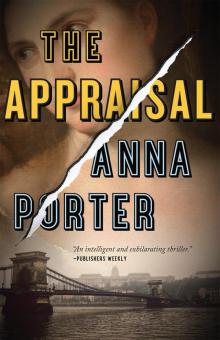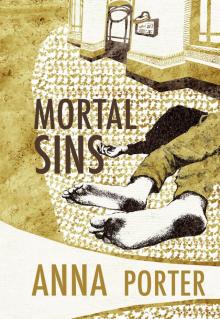- Home
- Anna Porter
Deceptions Page 20
Deceptions Read online
Page 20
“And the neighbour had seen you.”
“Not then, earlier, when I was trying to find out whether the man who had killed the lawyer was, in fact, Berkowitz.”
“The neighbour would recognize you.”
“Yes, but I wore a wig and stuff. She wouldn’t know me as me.”
“I did.”
“Yes, but you have seen that getup before, and she hadn’t.”
“She?”
“Her name is Zsuzsa Klein. Her grandfather had been a modest art collector. Killed in 1945.”
“How modest?”
“Not very. He travelled a lot, bought paintings and sculptures for his home. In a journal that had been either his or his son’s, he had listed a Verrocchio and a Klimt. The journal is a tiny old-fashioned leather-bound notebook with handwritten lists of paintings and the dates they were painted. There is mention of a Caravaggio, but I couldn’t tell from his Hungarian notes whether it was something he had seen or purchased.”
“How did you find all that?”
“Your Historical Archives of the Communist era. It seems the Kleins were not in the regime’s good graces. Maybe they had too much money before the war.”
“What happened to them?” Attila remembered his own unfortunate experiences with the system that barred anyone considered a class enemy from perks such as education, travel, or a good place to live.
“Zsuzsa’s grandfather — the one who collected the art — was killed by your Nazis.”
“They were not my Nazis.”
“Whatever. One of them took all the art from the house, and the only reason Zsuzsa’s father survived was that his father hid him in a sea chest.”
“He didn’t claim any of the paintings?”
“Zsuzsa said it was impossible before 1989 and too late after. But her father did take her to galleries in Vienna, Berlin, Paris, London, Warsaw. Showed her some paintings by artists he may have remembered.” As she said that, she thought of Simon taking her to the famous galleries, wanting her to see the best of the best. And later, to see the fakes no one knew were fakes that the museums displayed with pride. They are, he had told her, also great works of art, nothing phony about them, only about an art world that values objects not for their intrinsic qualities but for the names attached to them.
“Fingerprints?” he asked.
“None of mine.”
“Front door handle?”
“Wiped.”
“Kitchen? Bedroom? The body? Had to touch him to make sure he was dead . . .”
“Wiped everything, and I touched him wearing gloves. I think maybe he arrived with the person who killed him. There was no sign of forced entry.”
“You said you were there half an hour after he came home? There may be some prints. Anything else you noticed?”
“Apart from the fact that he didn’t seem to spend much time in his apartment, yes. His killer may have taken my photograph. Unless Berkowitz had pocketed it since the last time I was in his place, which is possible.” Since she had not told him about it in the first place, she didn’t tell Attila that she herself had removed the photo of the Vaszarys.
“I will find out more about him. And please come back to Strasbourg tonight.”
“You think it’s safer?”
“For you it’s safer anywhere — except perhaps in Russia.” Attila was thinking about Alexander’s warning.
He called Tibor to ask about Berkowitz. “Anything at all that you could find out,” he said. “There is nothing about him online except a couple of photographs, and even in those he is not named.”
“What kind of photographs?”
“Government types standing at some sort of ceremony. He is in the background. He was killed last night.”
“Not a great loss to humanity,” Tibor said, “and good news for your friend, I would think. I assume the police will do their usual excellent job tracking down who did it. By the way, talking about public employees, I have a good idea who the geezer was in Biro’s apartment.”
“You do?”
“Szabo, the parliamentary librarian. Don’t know how he got mixed up in this mess, except he needed the money. Wife is ill and his job pays nothing. My sources tell me he took a part-time job with Industry and Commerce. Bit of extra for the private clinic’s bills. Only reason his wife’s still alive . . .”
“Nagy?”
“Yes, the last time I checked, but portfolios don’t mean much these days as long as you toe the chief’s line, and Nagy does it well.”
Chapter Twenty-Five
Tibor called Attila’s cellphone a little after six the next morning. “You awake?” he asked.
“Jészus Maria . . .” Attila grumbled when he had found his voice.
“Just asking. Because this is not my favourite time to call people. As it happens, it’s not my favourite time to be awake, but since it’s you, my friend . . .” He stressed friend, making it clear that he was delivering one more favour, a gift of friendship that they both knew had often been tested. Without Tibor’s father’s reach into the Communist power elite of the pre-1989 years, Attila would not have been able to qualify for the police academy, and without Tibor’s own spectacular connections to the current power elite, Attila would not have come by intelligence that saved his career as a detective. On the other hand, without Attila’s interventions, Tibor would have been beaten to a pulp by a range of boys who liked to hit smaller boys. And, without Attila’s advice, he might have married the woman next door who turned out to be some sort of American spy.
“There are a few things you need to know about Gyula Berkowitz,” Tibor said, “and, given this man’s predilections and your own strange occupation, I am surprised you haven’t come across each other already. The man is a thug-for-hire. Most of the time he works out of the Ministry of Foreign Affairs, but he has done odd jobs for other ministries. He has been employed by, among others, Árpád Magyar, our minister of many portfolios and one of the prime minister’s mouthpieces. Recently, some of the guys on the second floor of the gothic castle were amazed to see him coming and going through the parliamentarians’ exit as if he belonged. Why did you ask?”
“They know him?” Attila asked, not answering Tibor’s question.
“Some do. He has worked for a number of our worthies, including Németh and Nagy and the deputy prime minister, but being a thug-for-hire would not, normally, offer such privileges.”
“Have you any idea where he lives?”
“He has an apartment somewhere in Pest.”
“Not on Rózsadomb?”
“Not as far as my sources tell me. He lives closer to the gothic castle. But given how much he gets paid for his work, he could certainly afford a house on the hill.”
“Did he have any hobbies?”
“Hobbies?” Tibor’s voice rose an octave. “Is this a trick question?”
“I mean hobbies like chess, or jogging, or card games . . .”
“Or archery?” Tibor asked.
“Yes, like archery.”
Tibor laughed. “If you knew that already, why in hell did you waste my time? Archery, as it happens, was his only hobby. Could have let me sleep in this morning and told me all this at the Király on our usual day in the baths.”
“We think he may be the man who shot the Vaszarys’ lawyer in Strasbourg last week.”
“We?”
“The art appraiser and I both think so, and I suspect the Strasbourg police will be able to identify him from photographs.”
“But why would someone like Berkowitz kill that man in Strasbourg?”
“I have no idea, though I am beginning to guess that the minister and his ambassador to the EU may not see eye to eye about something. I think I am about to find out why it was the lawyer who got killed.”
Attila called Helena, but she did not answer her pho
ne and this one took no messages.
Attila felt his way to the kitchen area of his Airbnb. After tapping the walls unsuccessfully for several minutes, he found the light switch and later, his cigarettes. The coffee maker’s ways were still a mystery, but he managed to boil water and pour it into a mug, adding a package of instant coffee. The sun had still not quite risen, but the sky had turned a soft pastel grey, so there was hope that the morning would arrive.
He called Irén next. “I will explain to Gustav,” Irén said, with a giggle. “He has been waiting patiently by my door. We thought you would be here by now.”
Attila apologized. He said something urgent had come up, and he would not be able to come for Gustav until the next day. He hoped Irén could manage till then. He was really more concerned about whether Gustav could manage, but he could hardly ask to speak to the dog.
“You’re not about to move yourself and Gustav to France?” Irén asked anxiously. “I don’t think he would like the food there. Too precious for a Hungarian dog, don’t you think?”
Attila admitted to having had similar reservations for himself about the idea of his settling in France. But, he said, he had rented a dog-friendly Airbnb and would, if his assignment lasted, bring Gustav over.
He arrived early at Fou d’Café on Rue des Moulins. There was a lineup for takeout coffee and croissants. When he indicated that he wanted a table, the waitress reassured him that he would be served ahead of the line and showed him to a table with a view of the river. It was a reassuringly warm day, though thousands of leaves bobbed up and down with the waves and the wind coming off the mountains carried specks of rain. He hoped to be home by the end of October. He enjoyed being part of the October Revolution commemorations: not the ones sponsored by the government, but the ones his father’s old friends joined — those who were still alive.
He ordered a café au lait and unfurled the local paper. He made a valiant effort to read the front page and reassured himself that his French seemed to be improving. One headline was about a new hate-crime investigation by the Council of Europe’s Commissioner for Human Rights and another about the Roma of Gyöngyöspata. The Magoci murder had dropped off the news cycle.
Monique Audet arrived ten minutes late, perfect timing for a European lady who wished neither to offend by being too late nor to appear overly keen. She wore a red coat with large buttons over a short black skirt and the same high-heeled pumps that Attila had admired the last time they had met. Again, he was impressed by her ability to walk quickly and stay upright in shoes that would tilt someone else into a dive. She had piled her hair up into a sort of bird’s nest that bounced as she walked. He had to admit it suited her face, as did the heavily accentuated eyebrows she seemed to have developed overnight. What, he wondered, had happened in the past couple of years that made some women want to look so furry? He was trying to remember Helena’s early morning face, before she put on her makeup, the face she had turned to him when they woke up in his apartment. Soft light brown eyebrows, translucent eyelids, hair mussed up around her forehead.
What had he led her into? This job with the Vaszarys’ painting had become dangerous, and he now suspected that he had innocently lured her here under false pretences. That she had come only because he had asked, and the person who wanted him appointed to Vaszary chose him specifically because he could be counted on to bring Helena to Strasbourg.
“C’est formidable de vous voir ici, Monsieur,” Monique said as she stretched out her hand for a languid shake.
“Indeed,” Attila said. He stood as she positioned herself to sit , then pushed the chair in under her bum as she sat down again. An old-fashioned gesture but he thought she would like it.
“Café au lait,” she said to the waitress, “et un petit gateau. Non, l’autre,” pointing at a cake next to the one the waitress had selected. “Only last night, I was dreaming about that café in Paris, you know, Les Deux Magots, where Karl Lagerfeld used to go. You know, the fashion designer and many other famous people.”
“Picasso,” Attila suggested.
“Yes, Picasso.” She took a sip of her coffee. “So,” she said. “You have now talked with your boss, n’est-ce pas?”
“Yesterday,” Attila said. “And he is interested. But you understand that it’s hard for him to be convinced that you have valuable information unless you give us an idea of what exactly you are selling.”
She had stopped with her fork in the air, just as she was about to place a small portion of cake into her mouth. “He said that?”
“Not his exact words but that is what he is thinking.”
“And you have explained to him that I have records of all his conversations with Monsieur Magoci.”
“Yes.”
“All of them?”
“I don’t understand.”
“Did you inform Monsieur Vaszary that I have recordings of all his meetings with Monsieur Magoci?”
“Every one of them?” Another shot in the dark, but Vaszary hadn’t been clear about what he had to fear from the mademoiselle.
“C’est ça, monsieur. Exactly how did you think I could transcribe what went on in the meetings if I didn’t have the recordings?”
“I thought,” Attila said, “you had kept his notes of the meetings.”
“No, Monsieur. I have tous les enregistrements audio — that is, recordings, in your language. I told you it was the only way Monsieur Magoci could be sure to remember exactly what had been said. And it was important to remember what was said because he had to follow very complicated instructions from your Monsieur Vaszary. Obviously, no simple matter.” She steepled her hands over the tiny cake and knitted her lush eyebrows at Attila. “Your Monsieur Vaszary speaks French tout à fait affreux and his English is, well, a little infantile, n’est-ce pas?”
“In particular,” Attila said, “Mr. Vaszary may be interested in his . . . discussions about the painting.”
“Surely he remembers that all the discussions were about the painting?”
“Well, yes,” Attila said, still guessing, “about the sale?”
“Particularly about the auction. Monsieur Magoci had to contact all the possible buyers, send colour photos of the painting . . .”
“The buyers? You mean Piotr Grigoriev and Vladimir Azarov?”
“And the Pole, Waclaw something. A big scene, his shouting that the painting belonged to him. He wouldn’t pay for it. Then Monsieur Magoci showed him some papers and he stopped.”
“Anyone else?”
“There were others, but some dropped out early. They thought the price was too high. There were also meetings about the monsieur from Poland. All of these to be confidential because your minister had other ideas.”
“Minister?”
“Your Minister of Justice, he was not to know about the sale of the painting. Monsieur Vaszary told us everything. How he was unhappy with the deal from the minister. This artist’s last painting sold for 21 million euros, and prices go up all the time. He thought the minister was taking advantage of his position. He thought the 50 thousand was a joke, and he didn’t need the job here if he had the millions. Monsieur Magoci had the contacts to set up the funds where only Monsieur Vaszary could find them.”
“He had helped other people hide illegal funds,” Attila suggested, hoping she would talk about the scheme to sell the painting and hide the money offshore. Hébert had mentioned Magoci’s reputation for money laundering. But what was the deal between Magyar and Vaszary? Was Vaszary going to keep it all? Had Magyar hired Berkowitz to prevent the deal?
“We do not think that is illegal. If it is your money, you can do what you want with it. Monsieur Magoci believed in free enterprise.”
“That was what he was hired to believe.”
“De plus, he had to meet with the appraiser because Monsieur Vaszary could hardly do that . . .”
“Whic
h appraiser?”
“I do not understand. You know her, yes? The one in Paris, of course.”
“But Mr. Vaszary had another appraiser as well.”
“That would be ridiculous. The woman in Paris — Mademoiselle Marsh — is the perfect choice for this work, she came highly recommended, and she was acceptable to all the buyers. I actually have that in writing, that every one of them agreed she was good. If your Monsieur Vaszary has lost his copies of their letters . . .” She gave him a warm, angelic smile that implied she assumed he was an idiot in the pay of someone whose memory was even less reliable than her dead boss’s.
He had been the one who approached Helena for the appraisal. He had invited her to come and meet with the soon-to-be-divorced Gizella. He was trying to reconstruct what had happened just before he went to Paris. What exactly had Gizella said?
“And the divorce?” he asked.
“What divorce?”
“Mrs. Vaszary hired him to handle her divorce?”
“Monsieur Magoci knew nothing about a divorce. Monsieur Magoci had no dealings de tout with Mrs. Vaszary except about bringing the appraiser — Helena Marsh, n’est pas? — to Strasbourg, so she could see the painting.” She tapped her fork on her plate as if to make sure she had his full attention before she asked, “What is Monsieur Vaszary’s offer, Attila, if I may?”
“He suggests half a million euros.”
Monique Audet laughed.
Chapter Twenty-Six
When Helena arrived at the duplex, the police tape was still around Berkowitz’s door, but there was no police officer in front of the house, no police car, and no one lurking behind the fence. Attila had mentioned the Budapest force was short-staffed. Since the cutbacks, the minister had called for significant redeployments in the interests of public security. That, according to Attila, meant public relations, making sure that a lot of uniforms wandered about the streets, trying to look attentive.
She wore her Marianne Lewis outfit, with a new-to-Marianne unflattering leather jacket over tight-fitting pants with rows of silver buttons down each side. She had bought the clothes in a second-hand store near the hotel. “I would not recommend you shop on Rákóczy Avenue, madam,” the concierge had advised, but he would not have known how far Marianne Lewis’s clothing interests stretched.

 Deceptions
Deceptions Hidden Agenda
Hidden Agenda The Appraisal
The Appraisal Mortal Sins
Mortal Sins In Other Words
In Other Words